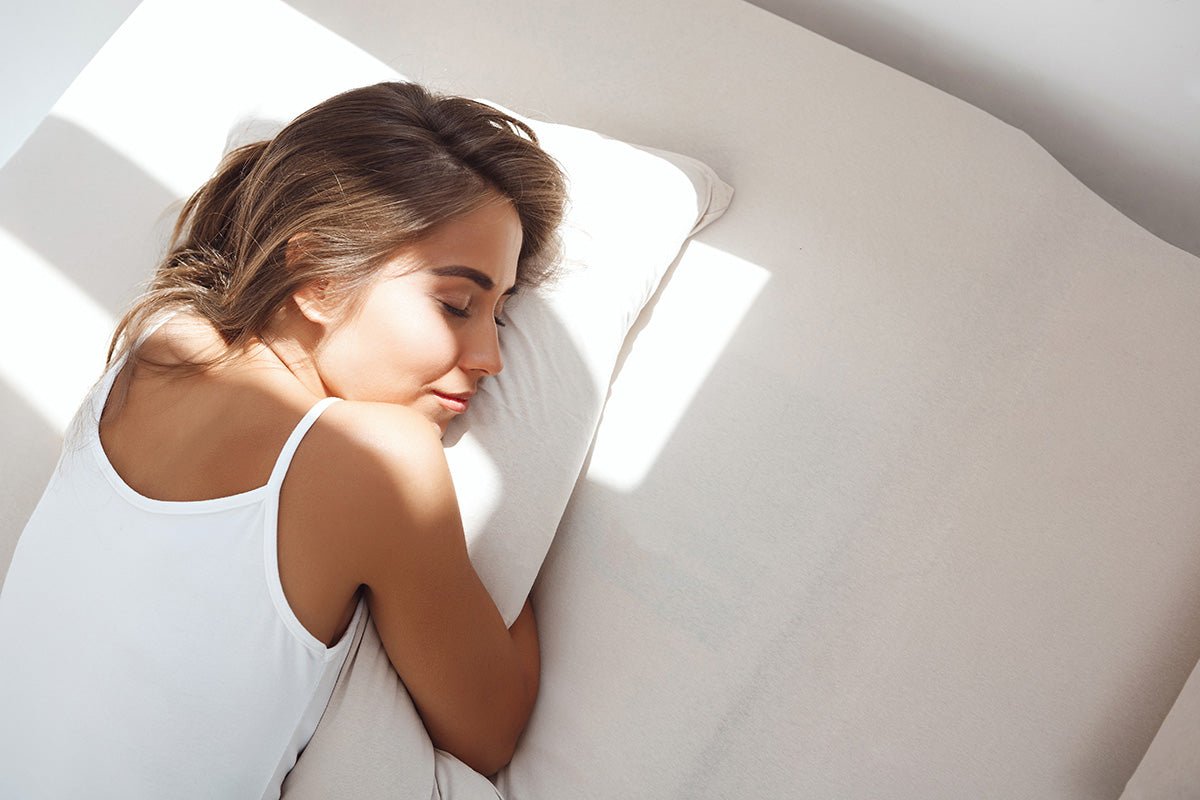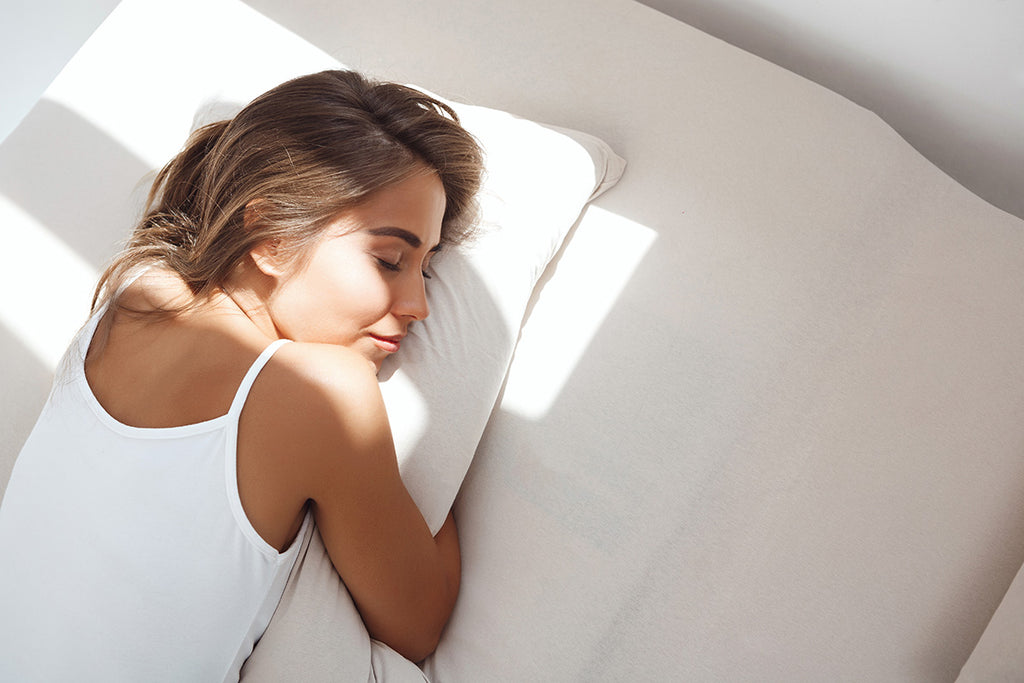
10 Top Tips For A Good Night's Sleep

Sleep issues plague the majority of us, with 71% of adults not getting the recommended amount each night. Whether you struggle with the amount of sleep or the quality of sleep that you get, the experience can be very distressing.
Low-quality sleep impacts your ability to drive safely, manage your emotions, and keep your productivity where it needs to be. When you don’t get enough sleep, your relationships, health, and career all suffer – which isn’t much fun at all.
Fortunately, there are plenty of tricks on hand to help you improve your sleep and, hopefully, your life! Here are our top ten tips for a better night’s sleep.
-
Create the right environment
Unless you’re one of the lucky few who can fall asleep at the drop of a hat, environment really matters when it comes to bedtime. Getting the temperature right, limiting noise, and creating a dark room can have a huge effect on your ability to fall – and stay – asleep.
- Temperature: Our bodies naturally drop a couple of degrees when sleeping, so making sure your room is cool can will encourage your body to shift into sleep mode.
- Noise: If you’re constantly being awoken by the sound of a sleeping partner, partying housemates, or noise from the road outside, try earplugs. A lot of people find silicone earplugs to be more effective than traditional foam ones. They essentially form a seal between your ears and the outside world, making it a lot harder for noise to break through.
- Light: Being woken by the rising sun sounds romantic but, in reality, it can mean getting a wake-up call much earlier than is necessary. Blackout blinds solve this problem, while also blocking out light from other sources.
-
Stick to a routine
If you go to a sleep clinic, one of the first things they’ll advise is to stick to the same routine every night. A good sleep routine also means no napping during the day and no screen time for the hour or so before bed. Going to bed and getting up at the same time every day helps train your body to sleep during these hours, even if it doesn’t seem to be working at first. Stick with it and you’ll soon reap the benefits.
-
Keep the bedroom for sleeping
The ancient art of feng shui says that we should keep the bedroom for sleeping only (well, and one other thing). You might not believe in feng shui, but the principle stands up logically. Having a dedicated space for rest makes it a lot easier to compartmentalise and switch off from the other aspects of life. This might not be possible if you live in a studio or house share, though. In which case, apply the same concept to your bed – don’t work in it, don’t eat in it, and don’t stay up late watching films in it.
-
Monitor your light exposure
Getting enough sunlight exposure during the day is imperative to maintaining your body’s circadian rhythm, which is what’s responsible for keeping your body clock in order. Our circadian rhythms are also confused by the blue light that radiates from our phone and laptop screens. Looking at blue light too late at night can make it harder for your body to realise it’s time to sleep. You can combat this by turning on the yellow light setting when using technology in the evening. Most modern mobile phones now do this automatically, but your laptop might not – in which case you can usually download an app to take care of it for you.
-
Use exercise to your advantage
Gentle stretching before bed can be an effective tool for those who struggle to wind down, and especially those with restless legs syndrome (RLS). Avoid anything too strenuous though, or you might accidentally send your body back into ‘activity’ mode. Intense exercise earlier during the day can, however, help tire you out for bedtime. The best time for exercise differs from person to person, to experiment to figure out what works best for you.
-
Change your bedding
Making sure that your pillow and mattress are the right level of firmness isn’t just about comfort, it also has an impact on the quality of your sleep. If changing these doesn’t solve your problems, then it could be worth considering a weighted blanket as well. Consider switching to a hypoallergenic pillow if you find yourself waking up with a stuffy nose. A silk pillow is hypoallergenic and will work as a natural body temperature regulator, with the added bonus of keeping you cool at night.
-
Wake up at the end of a sleep cycle
Sleep cycles work in roughly 90-minute increments, ending with REM sleep. When you wake up from deep sleep, you can feel groggy and tired throughout the day. However, waking up near the end of a sleep cycle can make it a lot easier to get out of bed, even if it means less sleep overall. You might wonder how you’re supposed to control when you wake up in relation to your cycle. The answer is technology. There are apps, alarm clocks, and watches that can monitor your heartbeat to figure out which part of the cycle you’re in, waking you up at the optimum point within a set window of time.
-
Be aware of your diet
Healthy eating is important for so many reasons, and sleep is no exception. Foods that contain serotonin, which is essential for melatonin production, might be especially helpful. These include salmon, chicken, milk, and rice, among others. Avoiding eating large meals near bedtime means your digestion won’t be working overtime while you sleep. If your growling stomach is keeping you up, have a small but filling snack, such as a piece of cheese, to curb your appetite until morning.
-
Limit certain drinks
Yep, you guessed it – one of the primary culprits for a bad night’s sleep is alcohol. While you might find it easier to fall asleep after knocking back a glass of wine or two, it’s likely that the quality of sleep you get won’t be great. The same goes for coffee which, as a stimulant, has the reverse effect to making you fall asleep. Limiting your intake of the beverage past the early afternoon can make a huge difference to what happens when you hit the hay later on that night. If you want to curl up with a hot drink in the evening, the best choice is herbal tea. Chamomile, peppermint, and ginger teas all contain no caffeine at all, making them the perfect choice for a late-night drink.
-
Prioritise relaxation
We know, it’s easier said than done, but prioritising relaxation is potentially the biggest factor in getting a better night’s sleep. A nightly relaxation routine that doesn’t involve clockwatching will help you to avoid worrying while you’re trying to fall asleep, and can be as simple as a short yoga session or reading a chapter of your book. If you’ve been lying in bed for an hour and still no sleep, get up and do something different. When you return to bed, you’ll reset the winddown process – hopefully with better luck. Remove the pressure to fall asleep and instead remember that there are huge benefits to just resting your eyes and body. Focusing on rest over sleep can actually have the opposite effect, allowing you to relax and eventually fall asleep without trying.
What to do if all else fails
Keeping a sleep diary will allow you to monitor what works, as well as what doesn’t. If you find that nothing works, it might be time to visit the doctor. You could be unknowingly suffering from a medical condition, such as sleep apnoea, insomnia, or any of the other multiple disorders that can ruin your sleep quality. Speak to your doctor about trying supplements – magnesium and melatonin are both well-known to help with a whole host of sleep issues. And if you’d rather not take any tablets, it could be worth looking into alternative therapies, such as acupuncture, which has been proven to have a positive effect on the symptoms of insomnia.
